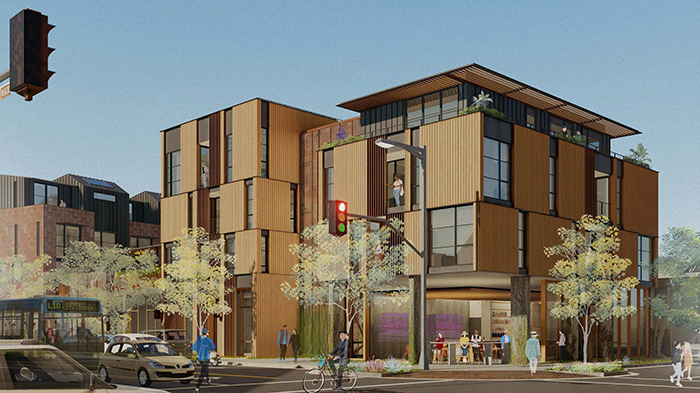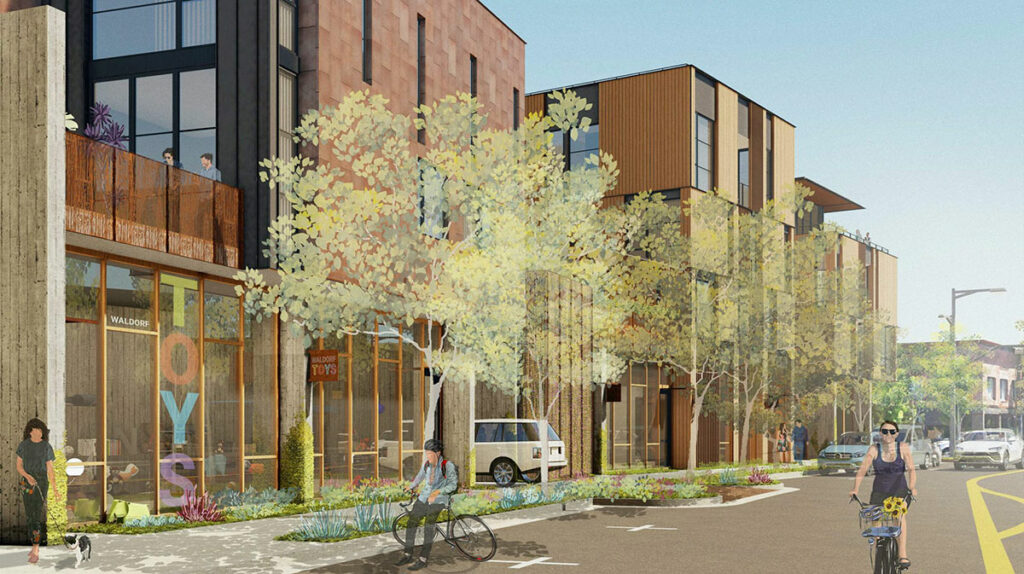
As Piazza Hospitality’s H4 project at 400 Healdsburg Ave. nears its next Planning Commission hearing sometime in August, questions have surfaced about the validity of their application to build the residential hotel they envision—16 rooms, 37 beds, mini-kitchens in most rooms and an on-site restaurant, at the downtown corner of North Street and Healdsburg Avenue.
The questions relate to the approval of Piazza’s application for the process, which was signed off on by city staff on Jan. 16, 2019—an approval that “deemed complete” Piazza’s application. That was the date that the new hotel ordinance went into effect, which indicates the hotel was approved under the new limitations, not the old ones.
According to current senior planner Ellen McDonald, who is handling Piazza’s current application process, “Completeness review is a simple administrative determination by staff that all the necessary materials have been submitted in order to review and act upon an application.”
The application was submitted to the city on Jan. 14, 2019, and two days later Scott Duiven, then acting as a senior planner tasked with shepherding Piazza’s application through city directors, sent Piazza’s principals and architect a letter of confirmation. It read:

“Pursuant to the Permit Streamlining Act (Government Code Chapter 4.5 of Title 7), your application has been deemed complete by the Planning Department. This application will be processed in accordance with the zoning provisions of the Healdsburg Municipal Code in effect on January 16, 2019.”
That date, Jan. 16, is significant because it is the date that the city’s new hotel rules, Ordinance No. 1181, took effect. That ordinance was passed by the City Council on Dec 3, 2018, after significant debate; it was again passed on Dec. 17 on its second reading, with the usual caveat that it would take effect 30 days later.
Thirty days after Dec. 17, 2018 was Jan. 16, 2019, since December has 31 days. If, as Duiven’s letter stated, the application was approved on that date, and it would be processed “in accordance with the zoning provisions of the Healdsburg Municipal Code in effect on January 16, 2019,” then the hotel is subject to the limitations of the new ordinance, not the previous one.
In other words, for Piazza to continue building the hotel they proposed may be a non-permitted use, prohibited by the city in Ordinance No. 1181, effective Jan. 16, 2019.
The Hotel Ordinance
The Healdsburg City Council debated a new hotel ordinance through much of 2018 in response to public concern about rapid overdevelopment in the downtown area. A city-run community survey in March, 2018 revealed that residents were evenly split over whether there were “too many” or “about right/too few” hotel rooms in town, at 47%. But 71% said that hotel development had been growing “too fast” in town, compared to 21% who said “about right.”
After months of discussion and debate, the staff presented the City Council with a hotel ordinance on Dec. 3, 2018 that proposed limiting the number of rooms in a new hotel at five rooms on any block face and requiring that retail be on the ground floor, “in order to avoid an over-concentration of hotel uses within the downtown.”
As the final vote neared, the Planning Department told the Council that there was a project in the works that might exceed the proposed limits—the Duchamp Hotel, located on Foss Street in the Downtown Commercial District. This small, hard-to-find hotel is behind the Little Saint building on a dead-end street in back of several Healdsburg Avenue businesses, including Costeaux Bakery.
The Duchamp had an application filed with the city for an expansion of their hotel from 6 to 18 units, an increase greater than the five rooms the new ordinance would permit. So with open discussion of this in council meetings, the council agreed to include a caveat excluding any project that has been “deemed complete” by the time the ordinance goes into effect.
Mark Luziachof’s expansion of Duchamp had been applied for in October of 2018, before the council’s first vote on the new hotel ordinance. It was deemed complete on Nov. 13 (not Dec. 13 as previously reported), well ahead of the end of the 30-day period before the new ordinance taking effect, ahead even of the City Council’s final vote.
Being able to have a hotel project accepted as complete by the city prior to the effective date of the new hotel ordinance became known unofficially as “the Duchamp exception.” It was thought to apply only to that one project; however, the day after the council’s approval of the ordinance on Dec. 3, by a 4-1 vote, another hotel developer opened discussion with the city about moving forward with their own hotel, at variance with the new ordinance.
Application Process
But timelines and correspondence from the city’s public records on the application, DR 2019-02, demonstrate that Piazza’s application was not filed until Jan 14, 2019, and failed to become fully accepted by the city—“deemed complete”—prior to the Jan. 16 date when the new ordinance took effect.

According to Circe Sher, one of the principals of Piazza Hospitality, the company first sat down with David Mickaelian, then Healdsburg’s city manager, and Maya De Rosa, then the planning director, on Aug. 9, 2017, to introduce “the concept of a hotel on that site. We moved forward with designing, but then paused to focus on opening Harmon Guest House. The next meeting we have on record with the city is the 12/6/18 meeting.”
That Dec. 6 meeting was corroborated by a timeline that Duiven generated for Mickaelian, itemizing key dates in the approval process. The City Council passed the new ordinance on Dec. 3 by a 4-1 vote. The next day, Piazza requested a meeting with staff to discuss the project at 400 Healdsburg Ave. and “requirements for submitting prior to the effective date of the new ordinance in order to develop under the prior hotel regulations.” That meeting took place on Dec. 6, as Sher stated.
Almost four weeks later, on Jan. 2, 2019, Piazza submitted a preliminary application, seeking “initial feedback on completeness requirements,” according to Duiven’s timeline. City staff provided that feedback on Jan. 7, and Piazza then submitted a final application that is signed and dated by Paolo Petrone, the other Piazza principal, on Jan. 11.
Late Filing
However, Healdsburg City offices were closed on Friday, Jan. 11. The application was therefore officially received and date-stamped on Monday, Jan. 14. On that date, Duiven circulated a memo to the city staff who would be required to review the application for completeness and sign off on it. Those departments included public works, the building division, fire, police, electric and community services.
Duiven’s memo included the “Please Return Response by” date of Jan. 15, the next day. An accompanying email he sent read, “This submittal needs to be reviewed for completeness prior to the effective date of the recently adopted hotel ordinance which is January 16th. I need your response by 3pm tomorrow, January 15th. My apologies for the short turnaround.” The bold emphasis is in his email, as is his statement that the effective date of the new ordinance will be Jan. 16.
For the rest of Jan. 14 and Jan 15, a series of emails in city files show that Duiven drove a concerted process to have city staff review the application for completeness. Most of the department supervisors asked to review the application had no objection or comment, though several concerns were raised by then-Fire Marshall Linda Collister, including an error in the project boundaries as filed, and a question about the possible contamination of the primary lot at the corner of Healdsburg Avenue and North Street, which until the mid-1990s had been a gas station.
Regardless, she signed off on the application at about 9:30am on Jan. 16, a day after the deadline Duiven had proposed.
Curt Bates, still with the city’s public works department as principal engineer, also signed off on the project on Jan. 16, at 12:30pm, following some off-line discussions with Duiven referred to in his email.
Duiven’s “Completeness Letter” to Piazza was emailed at 2:56pm on Jan. 16. Just minutes later, at 3:05pm, Mickaelian emailed the City Council, city attorney Suzanne Zutler and then-planning and building director Maya DeRosa that the project had been deemed complete.
At 3:43pm, DeRosa forwarded her copy of Duiven’s completeness letter to the Planning Commission, saying that the 16-room hotel application “has been deemed complete prior to the new hotel ordinance becoming effective.”
Her comment is inaccurate. Consistent communications from the city underscore that the new ordinance became effective on Jan. 16, and not a day later, and the completion of the application was on that date, not a day sooner.
It should be stressed that city staff acted reasonably throughout the process, including Scott Duiven, then a senior planner and now the planning and building director. The only error was on De Rosa’s part, as she made the incorrect assumption that the former ordinance applied to the hotel application.
But for the past three years, that assumption has allowed Piazza to continue developing their four-story residential hotel, and city staff has continued to accept it as having slipped through under “the Duchamp exception.”








Reading this makes me wonder “who was trying to protect the rights of the people who defined the terms operative on Jan 16.” Why was everyone trying so hard to defy the rules?
No surprise here! The Matheson wasn’t an establishment in character with the other small storefronts and not even close to the number of seats of other restaurants in the plaza. The Planning commission simply ignored the complaints by the out going mayor they turned up the volume on the home boy who’s grandfather had worked nearby.
The planning chair Mr Civian was comparing the proposed deck that would hang over the street to the restaurants in France . The fact that it was out of character for Healdsburg did not matter.
Has anyone heard about what has happened with the RUSE ? Awfully quiet over there. How does something that monumental slip under the radar. How did the Panning Commission chair who is the general contractor on the Ruse project manage to avoid his conflict of interest on this project.
It’s a rubrics cube. Who of our elected leaders will right the moral compass that gone so askew in the last decade?
Well said Anne.